Technology
WhatsApp Calls And Trust-Based Funding: How This Unconventional US Grant Is Powering India's Young Founders
Karan Kamble
Sep 14, 2025, 10:50 AM | Updated 01:37 AM IST
Save & read from anywhere!
Bookmark stories for easy access on any device or the Swarajya app.
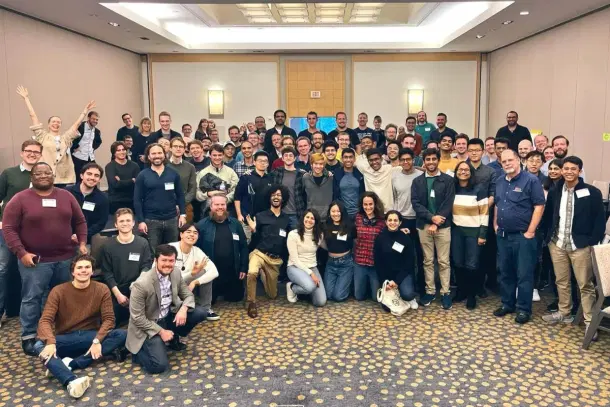
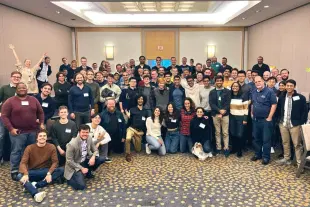
Shreepoorna S Rao, 23, is a high-flying founder of a startup building unmanned aerial vehicles (UAVs) in India for high-altitude — 45,000 feet high — commercial applications.
Educated at the Indian Institute of Technology (IIT) Madras, Rao is pushing the frontiers of indigenous aerospace technology. But it hasn't been smooth sailing for him, as it so happens with founders exploring on the edge of novelty, especially in the hardware space.
There was a time in July 2024 when the Mangaluru-born founder was nearly out of money to sustain his startup's activities. There were bills to pay, including a stipend for an intern — the only person working alongside Rao at his startup at the time.
Rao was high on ambition fuel, but seldom is that enough to go the distance. With funds having dried up, time seemed to stretch out inordinately, with thoughts warping like space-time around a gargantuan celestial object.
But then came a glimmer.
A couple of his founder-friends told Rao about a grant they had received from an American university that was an enormous help to them. They had only good things to say about this grant programme, as well as about the head of its India wing, and urged Rao to apply for the grant immediately.
If he could get it, the grant would be nothing short of a lifeline.
Despite his apprehensions surrounding grants in general, Rao took his friends' advice and submitted his application.
Just an email, a week's wait time, and a WhatsApp voice call later, Rao had secured the grant funding he needed to start resupplying air to his engine, just as he was running out of it.
This sum would hit his bank account in just three weeks' time, with none of that laborious documentation work, anxiety-riddled explanations for how the grant would be used at every step, and unproductive periodic reviews expected. The money could be deployed with freedom, ease, and at the founder's discretion.
Now, a year and some change later, Rao is building a 25,000-square-foot UAV warehouse in the Jakkur area of Bengaluru. Funding is not a worry at this time, and he is swamped with work.
The timely resuscitation in Rao's adventurous journey with Arctus Aerospace came from the Emergent Ventures grant programme. It's run by an unassuming research centre at an unassuming American university.
Strikingly, this low-overhead fellowship has been a quiet enabler for a whole new generation of Indians — though, of course, the grant operates worldwide — building all kinds of good stuff, from software and hardware startups and academic and research projects to nonprofits, podcasts, and even sometimes nothing in particular, just carrying a trace of promise.
Emergent Ventures: Backing Practical Ideas Early
The Mercatus Center at George Mason University in Arlington, Virginia, is the home of the Emergent Ventures (EV) grant. Drawing its name from the Latin word for "market," the centre has been largely focused on market-oriented ideas, economic research, and public policy since its inception in 1980.
It is here that EV was born in 2018 under the leadership of the centre's director, Tyler Cowen, a renowned American economist, author of many papers and bestselling books, and a podcaster, but also a terrific talent spotter, even described by a biotech investor and entrepreneur as "the best curator of talent in the world."
Through EV, Cowen wanted to "jumpstart high-reward ideas—moonshots in many cases—that advance prosperity, opportunity, liberty, and well-being." The "unusual" and the "unorthodox" were welcomed, and though the goal was "positive social change," fellows or grantees were free to make a profit off their project.
"Think of the goal of Emergent Ventures as supporting new ideas and projects that are too difficult, too hard to measure, too unusual, too foreign, too small, or…too something to make their way through the usual foundation and philanthropic process," Cowen wrote on his blog, announcing the new venture in 2018.
EV India kicked off in April 2020. Shruti Rajagopalan, an EV winner who had joined Mercatus in the fall of 2019 as a senior research fellow studying Indian political economy, teamed up with Cowen to evaluate applications for EV India.
Ever since, close to 250 thinkers and doers from India or projects related to India have been supported by the EV programme until the latest "cohort" inductions in May 2025.
While most of the Indian grantees over the years have been fledgling students, scholars, and entrepreneurs, some relatively better-known figures include journalist Prem Panicker, economist Ajay Shah, podcaster Amit Varma, and economic commentator Vivek Kaul (a frequent contributor to Swarajya once upon a time).
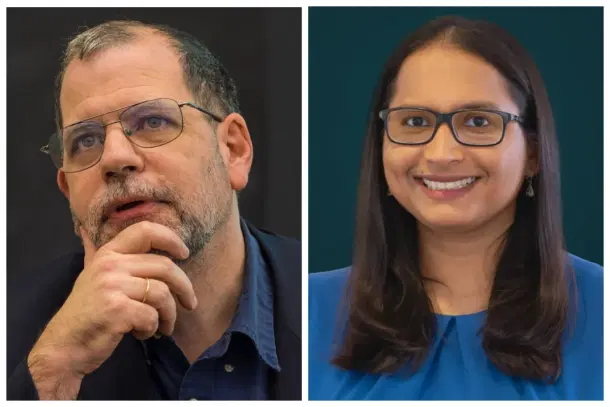
Where EV really shines is in spotting talent before it glows. "They're very good at finding these folks early and able to allocate resources to them at a point where no one else would. Tyler and Shruti Rajagopalan have done incredible work," says Arnav Bansal, the founder of Findparts.in, a component search tool for anyone tinkering with hardware or electronics. "You'll see folks get their EV grant, and a few years later is when some other serious investor type would trust them to invest in them. EV will always be early," he says.
Rao was picked in May of this year, as part of the tenth and latest India cohort, for a grant to build a UAV with a 5-metre wingspan. He wasn't particularly fond of grants before applying for EV. "I was wary about grants. A lot of Indian grants come with a lot of caveats where you need to report to them every month, decide and tell how you're going to spend the money, and a couple of them are not even grants but reimbursements. So I was not keen on a grant," Rao says.
But his two founder-friends, EV grantees, delivery drone innovator Naman Pushp of Airbound and Akash Kulgod of canine-centred deep-tech startup Dognosis, were able to persuade him. Within a week of applying for the grant, Rao received an email from Rajagopalan to set up a call.
It would be a WhatsApp audio call. "I spoke to her (Rajagopalan). I was asked what I was building, what I was doing. And I had already attached reference material (in my email). So she already knew what I was building; she just wanted to talk. Then she said on the call, 'We will give you the grant.' That, for me, was pretty new," Rao recounts.
Within a week, the money was in his bank account. "And that money came in very handy at a very right time — just when the company was almost dying," he says.
Flipping The Typical Grant Script
The EV grant process is almost nothing like the others. Grants, especially from the government, typically come with restrictive riders. One or more individuals might breathe down a founder's neck periodically about how they are spending the money and what they are accomplishing. Explanations may be demanded for any missteps during the exploratory stages, which, given the nature of any innovative work, ought to be regarded as perfectly natural but often aren't.
"Generally in India, if you want to get grants, say, at a research institute, they force you to incubate there, or they won't give you the grant. And even if you incubate there, you need to give them equity for free, and then they get you the startup government grant. And then on top of that, you need to report every quarter on how you spent the money, and you have restrictions — you can't spend it only on salaries, you can't spend it only on R&D, and all that," Rao explains, though expressing sympathy for why that is so. "Coming from a low-trust society (India), they (typical grant programmes) have to do all these things," he says.
EV, however, comes with no expectations of reviews or even of a definite outcome to hold up as validation for the grant offering. It's truly just free capital to those adjudged as deserving of it based on the merits of their case. "This (EV) was one of my first glimpses into how America operates. Extremely high trust. Within a call itself, a decision was made to give me a grant," shares Rao.
"They give you the grant with good faith that you will use that money for what you are given it to do. And until now, looking at their history, they have been pretty successful in developing this high-trust thing," he adds.
Achyut Tiwari, the founder of Geoliquefy, was so struck by the uniqueness of the application process that he quizzed Rajagopalan about it in the middle of pitching his venture to her on call. "Every call I got into previously was on Google Meet and Zoom. But they (EV) said they wanted to do a WhatsApp call. Strange, man. Then I got a call, and it was a WhatsApp audio call. We did an intro(duction), and after that, I just asked straightaway, 'Shruti, this is very interesting; why are you doing this on an audio call?'"
Rajagopalan's response speaks to the spirit of EV. "She mentioned that the idea was to reach even those people who have minimal resources and give them this grant," Tiwari says, adding that in these cases in particular, a grant is worth more than money. "It's a token that there's somebody who believes in your idea and that you can make it. That really moved me.”
This view is echoed by Khushi Mittal, a young founder and an EV grantee. "They are funding really young people who just don't have the financial backing or family support sometimes. And EV just funds them to go out there and pursue their dreams," she says.
"Even if there's a 90 per cent probability of someone not working on something and just taking the money and running away, it doesn't matter. It's still a push forward. So I always encourage people to apply, and the response has been great so far," Mittal adds.
Tiwari's phone call lasted all of 19 minutes. He subsequently sent across a one-and-a-half-page proposal, and within a couple of weeks' time, he got the grant. "For an Indian, in 19-minute calls, there are mostly no conclusions. You just say hi, hello, kahaan se ho (where are you from), things like that, and thank you. Kal milte hai chai ke liye (Let's meet tomorrow for tea). So it was a very strange experience for me. And life-changing," he says.
For Neil Shroff, the founder of the contrarian idea conference "Basedcon," the whole duration from application to approval lasted just 10 days. "Filled out the application, had a call after that for some follow-up questions where some of our assumptions were challenged, we were asked to get back with further ideas, and then our grant was approved," he says.
Basedcon is "a conference series for big ideas across Indian technology, culture and society." Shroff won the EV grant in May, alongside founder-friends Shruthi Badri, Akash Kumar, and Yash Bhardwaj, to keep the Basedcon conferences going in India annually.
Tiwari, on the other hand, is building an AI-powered soil liquefaction analysis tool. Soil liquefaction is when solid ground suddenly starts behaving like a liquid. When that happens, typically in the event of a strong earthquake, buildings can sink, tilt, or collapse because the ground can no longer hold them up. This makes soil liquefaction analysis an essential component of construction. But the conventional process is manual, greatly demanding of time and skill, and expensive.
"What we do is streamline the whole thing using AI and a wealth of data. We have experts on board. So the process which generally takes four to 12 weeks? Instead, come to our model, just input the borehole data, and you'll have a full-fledged assessment of whether liquefaction will happen," Tiwari explains.
If liquefaction is deemed likely, the model even recommends mitigation methods. "So it's like an MRI for the earth," he says, noting that pre-assessment due to the model's use is the "game-changing thing" here.
The EV grant — Tiwari's only external funding source — is already helping greatly. "I got the grant on the fifth of August (2025). We are moving very fast. There is this quote, right: 'There are years when decades happen.' This is that sort of a thing," he says.
Like Rao, Tiwari noticed the trust built into the EV process. "It's a very trust-based thing. The onus is on the founder or the fellow or the grantee; you can use the grant as deemed feasible. In my case, I have committed that I'll be using this grant to enhance the business in the State of California. I'll be using the money for my visa and other things. And there's no deliverable as such. The system is such that you don't even need to explicitly mention it; you can keep the information confidential," he says.
Tiwari is kicking off his work in California because it's a geography that's particularly conducive to his field of work, besides also being a great enabler of business in a venture's early days.
In India, the ex-Tata Consultancy Services (TCS) data scientist is "working with an Indian partner for projects in Northern India, Arunachal, Ladakh, all those places."
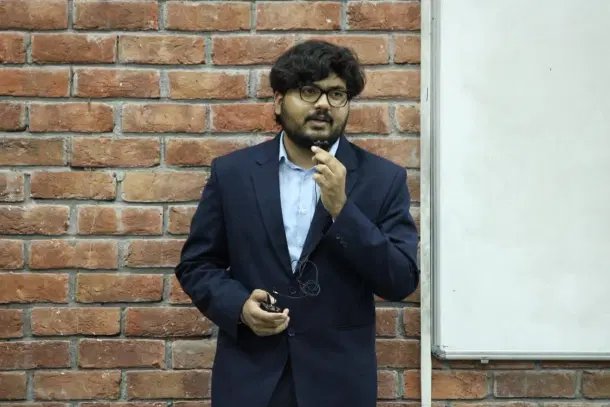
A Runway For Ideas To Take Off
Mittal, like Rao, is an aerospace innovator. She is the founder of a startup called Aspera Industries, which is building autonomous — no human at the cockpit — aircraft to move 5-to-10-tonne cargo. She aspires to transition to autonomous passenger transport someday.
What's remarkable about Mittal's offering, expounded in Swarajya previously, is that her planes will be able to take off from and land on stretches of land that barely qualify as airstrips, and will be able to do so over such short distances as 500-800 metres (m).
The planes won't just operate on land either. Mittal is building amphibious aircraft designed for water take-off and landings.
This daring work, now proceeding at pace, was just an improbable idea on paper as recently as last year. Then came the EV grant, which accelerated the transition from an unlikely idea to active investigation. "My entire EV application talked about how I'm just working on AI right now, but that I eventually want to build hypersonic planes. Shruti (Rajagopalan) got on a call with me and said, 'If you want to make planes, go make planes right now.' So she was one of those people who pushed me to go ahead and do this work," Mittal says.
Bansal highlights this aspect of EV's backing of an idea before it's even properly come together as a strength of the EV programme. "They give grants to really promising young people even before they know what problems they're going to end up working on. And then, maybe a year or two later, the problems will crystallise. I'm always impressed by that," he says.
For Mittal, as it was for others, it was a short WhatsApp call — just 10 minutes long. But in this short span of time, another attribute of EV India, specifically of its coordinator, shone through. Mittal was asked why she was dropping out of university and whether that was really necessary — a question arising from genuine concern. "She (Rajagopalan) is like a very motherly figure for all EV people. So when I was dropping out — she's someone who's very pro-school — she was like, no, don't drop out, until I gave her the right explanation for why I think it's a good idea for me. She is not someone who encourages people to drop out or come to this community because it's cool or whatever. It's a very practical-oriented approach," Mittal says.
The Lucknow-raised founder got a yes during her short call. She secured an $8,000 grant to sustain herself as she moved all the way from Edmonton in Canada — she studied at the University of Alberta before dropping out — to Bengaluru in pursuit of her aerospace goals and to lay the foundation for Aspera (previously called Observv). The grant walked into her bank account in about three weeks' time.
"Earlier, this work seemed almost impossible to me. But she (Rajagopalan) asked me to just go to Bengaluru and meet the EV people who are already working on moonshot ideas. So I moved here, met all the EV people (Rao among them), and that basically pushed me towards building things," says Mittal, who has since gone on to receive a $20,000 top-up to sustain her operations "and make the technology demonstrator before I get the pre-seed amount in my bank."
Mittal is currently building her test autonomous aircraft at a small private airstrip in Jangamakote, Chikkabalapur district, about 40 km from Bengaluru. If she succeeds in her cargo aircraft endeavour, she wishes to build made-in-India autonomous passenger aircraft someday. "I want to see an autonomous passenger airliner coming out of India. The dream is to make the next Airbus here," she says.
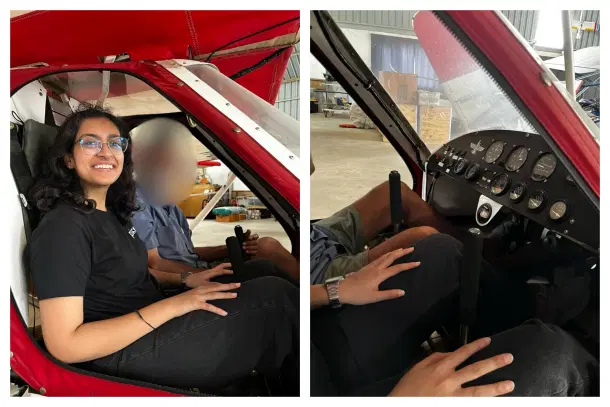
Powering The Indian Founder Community
Besides the no-strings-attached funding, the priceless thing that EV provides is a community of founders, all of whom are ready to help each other out at the drop of a hat. Any grantee is able to tap into the wide range of experience and expertise spread across the founders.
"I don't think I would be able to build my company solely if it wasn't for the founder community over there," says Mittal, an unequivocal vote of confidence in the EV India community.
"They opened up a community to me," Rao says. "This community is primarily folks of my age group working on cool stuff, hardware stuff, which, if you go to any traditional institution, they would say, 'This won't work,' or 'This will not happen,' or they will try to handhold you into different things," he adds.
The founders are in touch with each other through WhatsApp. "There are these WhatsApp groups. If you are in SF (San Francisco), you can just text in EV SF. If you are in Mumbai, Delhi, Bengaluru, or any part of the world, there are WhatsApp groups for all of these places, and there are EV people everywhere. So you can just reach out, get a couch somewhere in SF because of that or ask for any help needed," Mittal explains.
This worldwide community can help a grantee wherever they go. "EV got us more plugged into a super strong network in India. I also travel a lot for work, so it's an easy network to call upon if you find yourself in a new city," Shroff says.
With the help of the WhatsApp groups, the founders hire folks for their respective companies, share references and recommendations, and seek feedback on their work. "It's great to have this feeling, where all these founders who have raised money could just reach out to you over one WhatsApp message, and you can meet up," says Mittal, adding, "Even small things like incorporation, getting lawyers, CAs (chartered accountants) to big things like getting access to investors, good engineers, or just fact-checking things. It's all very helpful."
Beyond WhatsApp, EV India grantees make the effort every year to congregate in person. A three-day conference is held annually in a different city. Last year it was in Kochi. This year it will be in Bengaluru. "Hotels, flights, everything is covered by them," Mittal says. "They just bring everyone in, and we all have three days of just really heavy discussions about life, work, how it's going, and stuff like that."
The result is an extremely strong, well-knit community of young people who are all innovators in their own right. Whether the "system" enables their growth or not, they are happy to find pathways for growth within their own ecosystem.
Some of the EV grantees, for instance, have gone on to birth initiatives aligned with EV's spirit. "In 2021, I also created a microgrants programme for Solana (administered now by local Superteams), which is also heavily inspired by EV, and we promise a decision within 72 hours and payment within seven days for any ideas in content (media), code (projects), and community (events) related to or adjacent to crypto and Solana. We've done about $2 million in grants in India ever since too," Shroff says.
Even gradCapital, which backs student founders in India with $40,000 grants, was supported by EV India. Founder Abhishek Sethi was part of the seventh cohort announced in August 2024. He and his co-founders were placed in cohorts in Bengaluru so that they could be integrated into the Bengaluru startup ecosystem.
This makes Rao, whose startup was funded by gradCapital before EV, laughingly say, "So I would say I have been funded by Emergent Ventures twice. I got the gradCapital's Atomic Fellowship first, which was from Emergent Ventures, then gradCapital put in their investment cheque, and then Emergent Ventures came in to save the company."
All this entrepreneurial activity has had a profound impact on the founder community in India, particularly in Bengaluru. "I think it's very difficult to put in words what the community has done for Bengaluru in general. Most of the founders we know — and you've written about as well — are all EV-backed. And these are people who are highly respected and are doing genuinely great work, which will probably lead the country forward," Mittal says.
The success stories emerging from the EV programme represent more than individual entrepreneurial triumphs. They point to a future in India where self-motivated, innovative work will be widespread and democratised.
By devoting time and energy to developing cutting-edge solutions in aerospace, AI, and deep technology, these young innovators are laying the foundation for a self-reliant India that can compete comfortably on the global stage.
Karan Kamble writes on science and technology. He occasionally wears the hat of a video anchor for Swarajya's online video programmes.





